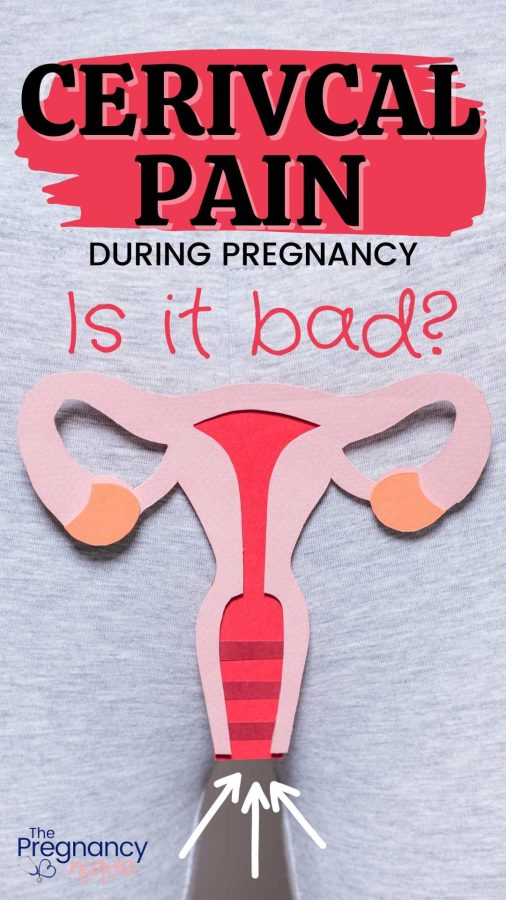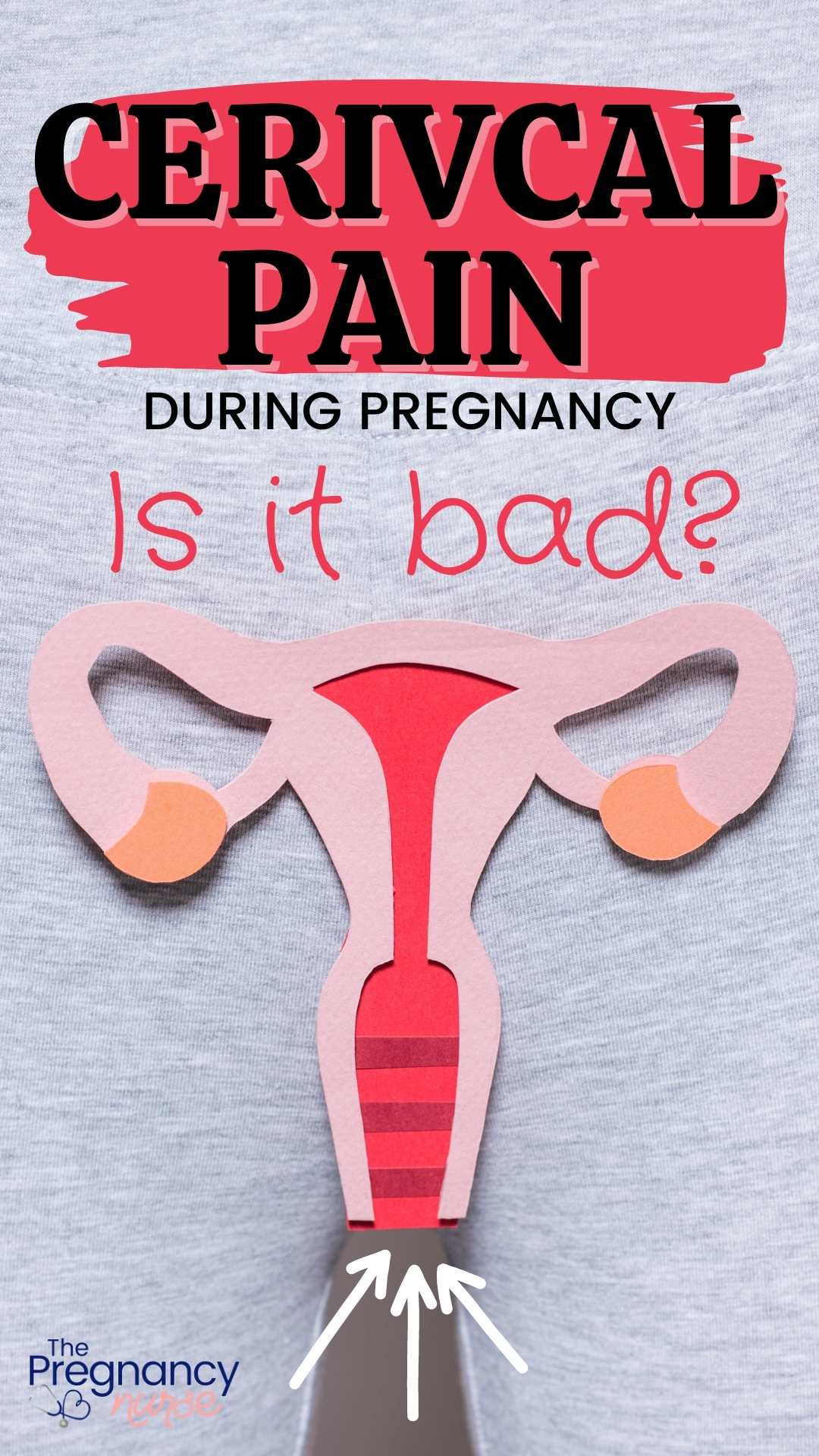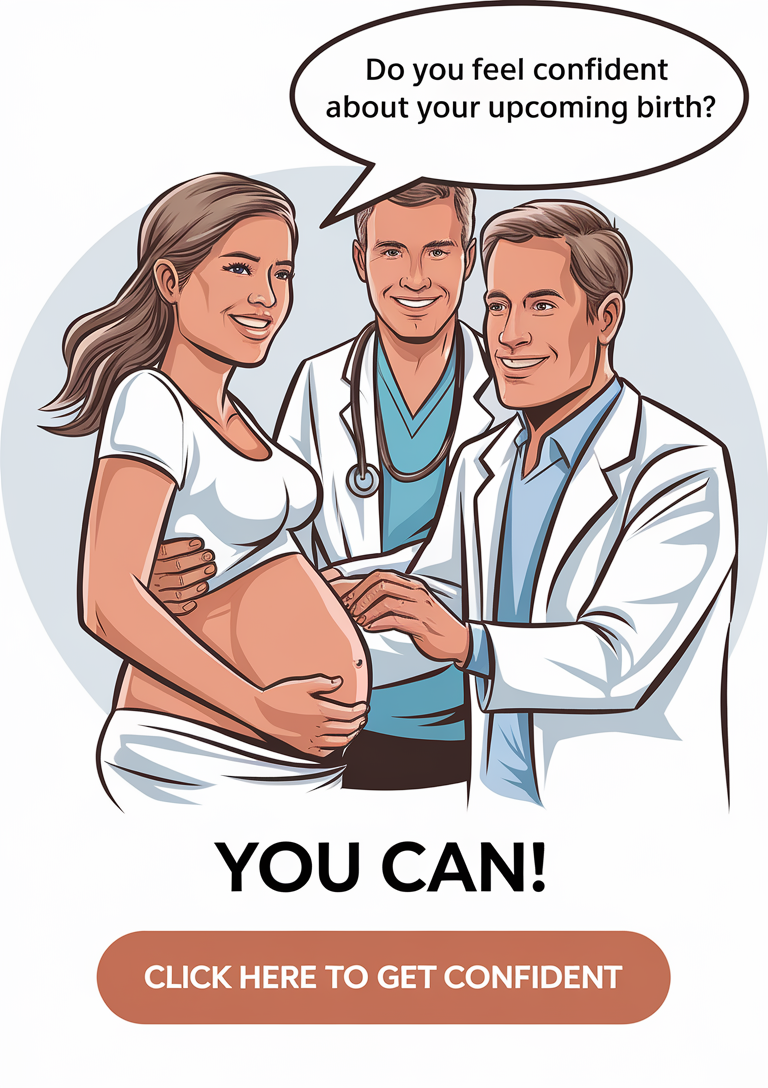During your pregnancy (especially your third trimester) you might experience a sharp pain in your cervix area. This pelvic pain can be a few different things. Today we’re going to talk about the different types of pains in the pelvic area and discuss when it could be a problem, or when you need to seek out your healthcare provider ASAP.
Quick reminder — you definitely want to take this information from an expert — it’s not something you want to want to get your info with lots of experience with pregnant bodies & women. I’m glad you’re here with me!

As always, this article is purely informational. The information within is only for entertainment purpose and all advice should be taken from your healthcare provider who knows your specific needs and circumstances. If you are having severe pain, or strong lower abdominal pain I would call your provider just to make sure things are OK. You may have specific needs (like a previa) that need to be taken care of ASAP.
Ok, let’s talk about the different pains you may experience:
Where & What is Your Cervix
The cervix is the end of your uterus. It is where it meets your vagina, similar to your rectum is where your intestines meet the world.
It is sort of on top of your vagina. It helps hold up your uterus and keeps baby from falling out as it (hopefully) stays closed during most of pregnancy.
The best way to know where your cervix is, is to have your provider point it out next time you have an exam — or to feel it yourself.
Want to know more about your cervix — check out these posts:
- What Cervix Dilation Should You Be at 36 Weeks of Pregnancy?
- What is an “Unfavorable Cervix”? What does it mean for your labor?
- Can I Refuse Cervical Checks in Labor? Declining cervix exams in pregnancy.
- 36 weeks Pregnant – Cervix is 1 cm dilated: When will labor start?
Causes of Cervical Pain
First off, some pregnant women feel like vaginal pain is cervical pain. So, it’s important to kind of know the difference, or talk with your healthcare professional if you are not sure.
No matter if the pain is caused by your cervix or by some other thing in your abdomen, it’s important to talk with your provider so you can know if it’s normal or not, or if they can do anything about it.
✨ Pro Tip: Just because something is normal doesn’t mean that things can’t be done. If you’re in a lot of pain, ask your provider what you could do. Often you can ask for a referral to physical therapy to see if they have any ideas.
The main causes of actual cervical pain is probably two fold:
- The baby’s head is pushing down on it (sometimes causing cervical dilation). Sometimes with fetal movements it sort of twists your cervix, which can be painful (but should be short in duration)
- The cervix opening — and clearly, we don’t want that too early in pregnancy.
The things I mention below are more causes of lower abdominal/pelvic pain that can feel like cervical pain.
An ovarian cyst can sometimes feel like cervical pain as those move with the baby growing and changes with a fallopian tube. Often you’ll hear about cysts on your ultrasound report. The good news is that they are generally harmless (and are on a LOT of those reports) — but it’s something to be aware of in case you have a weird pain in that general area.
Your growing baby may cause an intense pain in your round ligaments. These sort of attach your uterus to your body, and as your uterus grows they can really get stretched and let you know they’re getting to capacity. Normally these are shooting pains around your abdomen. Unlike contractions they don’t normally come and go every 3-5 minutes — they may last for a few minutes and then go away. Many people find these to be painful when they cough, sneeze, or get up to quickly. There are similar ligaments around your cervix — so that can be a source of pain in that area as well.
Contractions can cause something akin to cervical pain. You may feel baby’s head pushing on it — and all of that is normal, especially as you make it closer to the end of pregnancy..
Many people experience “lightning crotch pain” — while this is not your cervix, it is in a simlar area. Most people call it an electric shock pain (hence the “lightning pain” in their bones just above their urethra (the medical term for your pee hole) — called your pubic bone. It is due to your body relaxing that joint to prepare for birth, and your expanding uterus putting pressure on it. As the cartilage between the two bones opens up you may experience this due to those nerve endings separating. I have a whole post on pelvic pain that might interest you for more info on things like this (and what you can do). This can also be accompanied by sciatic nerve pain. It’s not fun at all.
Pro Tip: I have a whole post on hip pain during pregnancy that you might find helpful as well.
Bladder infections can be a cause of pains like this. More often it’s your bladder feeling cramping and gross. Most often this is felt just above your pubic bone (and deeper inside than lightening crotch). Kidney stones or a kidney infection could also be an issue, but more often that is back pain. However, if a kidney stone were to be stuck further down in your urinary system it can cause some pains in that general area as well. Since the lower part of the uterus is so close to the bladder, often it likes to cramp too if the bladder has an infection.

You can also have some pain at your urethra if you were to have an infection (or an STD). Remember that you have 3 holes in the area between your legs:
- Urethra — where you pee from
- Vagina — where the baby comes out (and your period blood comes from)
- Rectum — where the poop comes out
A large bowel movement can also sometimes cause cervical pain as the rectum is the next thing past your cervix. It can sometimes shift your uterus so that it kind of twists your cervix and causes pain. Once you have your BM the pain should go away.
❓ Labor can be SO confusing. I have a whole section just talking about how to know if you’re in labor in The Online Prenatal Class for Couples — people love hearing what’s normal from someone with so much experience. I’d love to help you too!
Cervix Pain Accompanied by Vaginal Bleeding
This can be problematic. Honestly, until you’re in labor (and are past 36 weeks) most any bleeding is somewhat disconcerting (unless after a vaginal exam or sexual intercourse — you might have small amounts of bleeding due to those things). But if neither of those have happened and you’re bleeding, I would call your provider. Most of them have someone to answer 24 hours/day (they may have a nurse answer first to triage any questions).
If you are having cervical pain accompanied by menstrual cramps (or like that) it could mean you’re going into labor and baby is going into the birth canal. We would prefer this not to happen before 36 weeks.
Cervical Pain Accompanied by Vaginal Discharge
Discharge can change so much during pregnancy, this one is harder to tell.
If you’re having a change in discharge, and cervical pain this is also something to talk with your provider about. It could also be an STD which would need antibiotics, or possibly a yeast infection of your vaginal area. Both of these things can cause irritation of the cervical area which can be helped. It is not unusual at all to get a yeast infection during pregnancy due to all the increased blood flow.
Cervical Pain in Second Trimester
This is something I would bring up to my doctor (and may call in if it hurts a lot). We definitely don’t want a preventable premature birth.
Is is possible that you have varicose veins in your birth canal area or on the outside of your vagina that seems like cervical pain.
It can also be round ligament pain — like we talked about above. If the pain extends up into your lower abdomen, that could be the culprit
It could also be incompetent cervix — which I’ll talk about more in the next section.
Cervical Pain in Early Pregnancy
If you’re in the first few weeks of pregnancy, sometimes I had pains like this as my uterus was growing. That first trimester has a lot of adjustments in your uterus (and abdomen) and pregnancy hormones to increase blood flow to your uterus in that area that just make things crazy. Be sure to talk with your health care provider about any pelvic pressure, or lower back pain early in pregnancy. We want to make sure everything is going well.
However, some women have what is called incompetent cervix (or cervical insufficiency) — this means that your cervix starts to just open as baby grows — it isn’t able to keep closed until baby is ready to be born (often resulting in a premature labor that is much too early).. Your doctor can do things to help this — so if you are having pain in that area be SURE to talk with them, the goal is to NOT have your cervix open until late pregnancy. Risk factors can be multiple pregnancies, a recent pregnancy or it happening previously.
They can actually check to see if you have a short cervix (normally they’re nice and long) with an ultrasound machine — they measure how long it is.
What to do about Cervical Pain
One of the BEST things is to make sure that you’re staying hydrated. This will keep braxton hicks contractions at bay, it’s good for your bladder, and honestly just good for your whole body. As baby grows they just take more and more fluids from you — so drink plenty of fluids (mostly water). Personally, I liked to try to get in a TON of water until abut dinner time, and then I wouldn’t drink as much so that I could sleep without peeing all night.
Sometimes a warm bath can help your body relax. This can be great for those tired ligaments that need a break in your nether regions. Remember a WARM bath, not a hot one — but they can be great for pain relief. and often help pelvic girdle pain in general.
Belly straps may help many of theses issues including the symptoms of lightning crotch, round ligament pain or generalized pain in your pelvic region. If you’re a pregnant woman considering these, I would encourage you to talk with your provider so they can help you make sure nothing else is wrong before you attempt to use them to fix the problem with support.
To Summarize:
- Cervical pain is something you should talk with your provider about. If it’s very intense or long-lasting, it is worth a phone call into them.
- Often it’s normal and NOT a big deal, but it can be a sign there’s a problem. No need to freak out until you talk to your provider though!
- Education is KEY to understanding what’s going on with your body as things are so different than they used to be.
Have you taken a prenatal class? The Online Prenatal Class for Couples really SIMPLIFIES birth for couples. In just a few hours they can feel more confident heading into birth. Prices start at just $35.
Did you know that those who take a prenatal class are 10% less likely to have a cesarean section? Crazy, right? When we teach about movement, communication, and natural processes it really DOES help! Come get your help!
Have you checked a birth class off your to do list✅? I have a few I recommend:
❤️ Best class for couples {per BabyList}
👩💻 Best class available on demand
⚡ Best class JUST for pain management
👶 Best Postpartum-Only Prep
❤️🧡💛💚💙💜 My favorite class is here.
Now is the time to get started!
Want to do a vibe check before diving into the whole thing with me? — check out my free labor pro tips. It’s your first step toward getting in the driver’s seat of your birth.






 When to Take Childbirth Class?
When to Take Childbirth Class?
